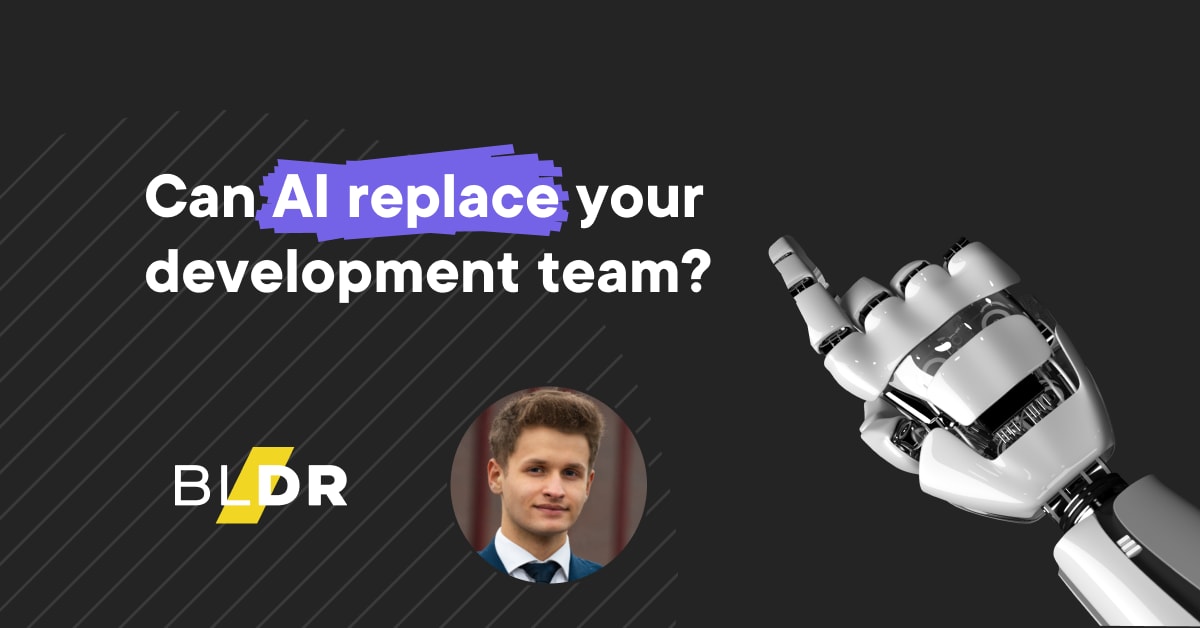Can AI replace your development team?
Saying that artificial intelligence speeds up coding is a cliché. The advancements in this area are massive, with new possibilities emerging each month for integrating AI into software development. Initially, tools like ChatGPT were seen as novelties—useful for simple tasks like generating boilerplate code. However, as adoption grows, AI has proven to be much more than a gimmick.
Recent data shows that AI in development workflows has surged. A 2024 Stack Overflow survey reveals that nearly 50% of developers are already using AI tools, with over 60% expecting AI to play a major role in their processes within five years.
But can AI replace development teams, or does it merely enhance the work of experienced engineers? Let’s explore contexts where AI remains an assistant, not an independent developer.

Table of contents
Can AI replace developers in writing code?
Despite concerns, AI is not here to replace developers; for the time being, it’s here to assist them. Think of AI as an intern—potentially valuable but requiring guidance to be truly effective. AI accelerates and automates repetitive tasks, such as generating code snippets or suggesting solutions based on given prompts or examples. While it can handle routine work, the real value emerges when AI acts as a support tool for experienced developers. With AI managing mundane tasks, developers can focus on the more creative and problem-solving aspects of coding, leading to higher productivity and more innovative solutions.
Why AI can’t fully replace a developer team: key limitations
AI can speed up coding, but it has limitations that prevent it from replacing development teams. One key issue is its lack of context—AI doesn’t understand business requirements or the application’s intricacies. It processes data but doesn’t grasp its broader meaning. This is where developers come in.
They bridge the gap between code and business needs, ensuring applications are secure, optimized, and scalable. While AI generates functional code, it can’t foresee long-term consequences, such as security flaws, performance issues. Experienced developers ensure the code is reliable and future-proof.
They have spent years learning how to choose the right design patterns for the given problem, and they excel at it. Beyond everything mentioned above, their advantage over AI lies in their ability to think abstractly and make decisions about design patterns (such as Singleton, Factory, Observer, Strategy or Adapter) within the team and the overall system architecture.
AI and security: can AI write secure code?
Most of the AI coding tools and techniques lacks the depth needed to identify the product’s security vulnerabilities. Additionally, without proper guidance from an experienced developer, AI-generated code may not follow best practices, leading to solutions that work initially but are not only exploitable but also difficult to maintain. This can result in scalability, performance, and security issues. A senior developer must conduct a thorough security review to ensure AI-generated code adheres to secure coding practices. At companies like Boldare, this oversight ensures applications are not only functional but also secure and resilient to potential threats.
AI and code quality: why human developers are necessary
While AI can generate code efficiently, it often results in inefficient, cluttered codebases. AI doesn’t prioritize long-term maintainability or scalability, which can cause problems down the line. It follows the most recurring code when given a task to execute, it is a challenge for the developers to show the best way for the AI to achieve given goal.
Human developers are essential for forcing AI-generated code to be living up to the best standards, ensuring it is clean, readable, and maintainable. They apply best practices like SOLID principles and clean code standards to make sure the application is sustainable. Without human oversight, AI might create technically correct but hard-to-maintain code.
How AI enhances developer productivity: the role of AI as a support tool
So, can AI replace an entire development team? The short answer is no. While AI is excellent at automating repetitive tasks and speeding up coding, it can’t design complex systems, understand business context, or ensure long-term code quality. Experienced developers and the team are still essential to guide the project, define requirements, and ensure that the code is optimized and secure. This is the best way to leverage their expertise today.
The most effective use of AI in development is as a tool to assist skilled engineers. By handling time-consuming tasks, AI frees developers to focus on higher-level problem-solving and creative solutions. This collaboration between AI and developers boosts productivity and results in better-quality software. Ultimately, AI is a powerful tool that complements skilled developers, but it is the developers who provide the strategic oversight and technical expertise to create secure, high-quality applications.

Share this article:







